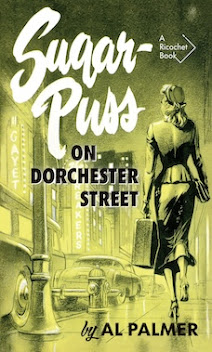Montreal has produced some pretty awful writers, but the worst must surely be Nicholas A. Rossi. We don't talk about Rossi. Never did. Seventy years ago today he bludgeoned an old woman to death with an iron pipe. None of the Montreal papers covered the trial. The only mention of the crime came in this edited wire service story that
The Gazette slipped between ads for the National Trust and Rols-Rim desks on the day after Rossi's execution:
 |
| The Gazette, 20 June 1945, p. 7 |
A murder committed by a "writer of pulp fiction murder mysteries" should've attracted much more attention. I blame it on the war. Only the
Hartford Courant covered the unpleasantness in any detail. Several years later, a rival paper's wag described the Wegner murder as "one of the most bizarre cases in Connecticut criminal history." Can there really have been any other so odd?
Let's begin with the victim, a wealthy, widowed German immigrant whose only son was off fighting the Nazis. Mrs Wegner was the proprietress of what was cautiously described as "a high class boarding house." Early on the morning of 23 September 1943, police found her bloodied body wrapped in a comforter on the floor of the backyard garage. Suspicion fell first on a gentleman friend, bounced, then landed on Nick and Lana Williams, a married couple who lived in the basement quarters. They'd gone missing, as had Mrs Wegner's 1942 Chevrolet coupe.
 |
| Nick and Lana Williams at the time of their capture. |
The pair made it as far as Missouri before being picked up trying to buy black market gasoline. It took little time for the police to identify the pair as the couple wanted in the Wegner murder. Further truths were revealed when stubble began to appear on Lana Williams' face. With this discovery, the pair not only admitted to being brothers Nicholas and Robert Rossi, but confessed to the killing.
They'd arrived in Plainville the previous month. Nicholas worked as fire warden of the Hotel Burritt in nearby New Britain, while younger brother Robert, as "Lana", served as Mrs Wegner's maid. According to
one report, "Robert, in his skirts and wig, had the Wegner family fooled to the extent that he acted as personal maid and on several occasions aided Mrs. Wegner and her daughter-in-law in dressing."
The only account of the actual murder came from the brothers themselves. They told police that on the evening of the murder they'd ransacked the house while their landlady had been at the movies. Finding little, they'd waited for Mrs Wegner to return home with the intent of taking her car, purse, and whatever jewels she might've been wearing. Things got out of hand.
 |
| The Hartford Courant, 28 September 1943 |
The brothers were brought to Hartford for a trial, found guilty, and sentenced to death. While Nicholas was, of course, executed, Robert was spared the same fate by a public defender who managed to convince the Board of Pardons that he should not be held to the same account. It was pointed out that Nicholas had come up with the scheme to rob Mrs Wegner and it was he who had killed the old lady. Added to the obvious, was a novel argument that the older brother had been played a dominant role in the relationship, with Robert's transvestism presented as evidence of his submissive nature.

In writing about the Rossi brothers, both UPI and AP repeatedly employed the very same words: "born of the same Italian mother, but different Negro fathers." It could not have been easy growing up the son of a white mother and black father in early 20th-century Montreal. I'm left wondering just how Nicholas came to attend Howard University. And then it was off to law school in Philadelphia? While I question that Nicholas Rossi fought "more than 100 bouts under the name Squire Williams," traces of a record linger. He was, for example, a runner-up in the 1937 Philadelphia Golden Gloves Championships.
But what of those pulp fiction murder mysteries? Scouring the references, I've not been able to find anything credited to a Nicholas Rossi or Nick Williams... or Squire Williams for that matter. When arrested, police recorded his occupation as "writer". Interesting to note, I think, that along with money, jewels and furs, the brothers had stolen a typewriter from the Wegner house. Sixty-eight years after his death, Nicholas Rossi remains the only writer to have been executed by the State of Connecticut... the only Canadian, too.
 |
| The Milwaukee Sentinel, 20 June 1945 |
Brother Robert remained in prison until 1964 when his sentence was commuted. The Connecticut Board of Pardons was told that the former maid intended to leave the state to accept a job in a New Jersey hospital. There the trail ends.
My thanks to Kirstin Jones for the photograph of Mrs Wegner's gravesite.
I first learned of this tragic episode in Canadian literary history through Kristian Gravenor's cool Coolopolis blog. Kristian's post on the Rossi brothers can be found through here.
























































